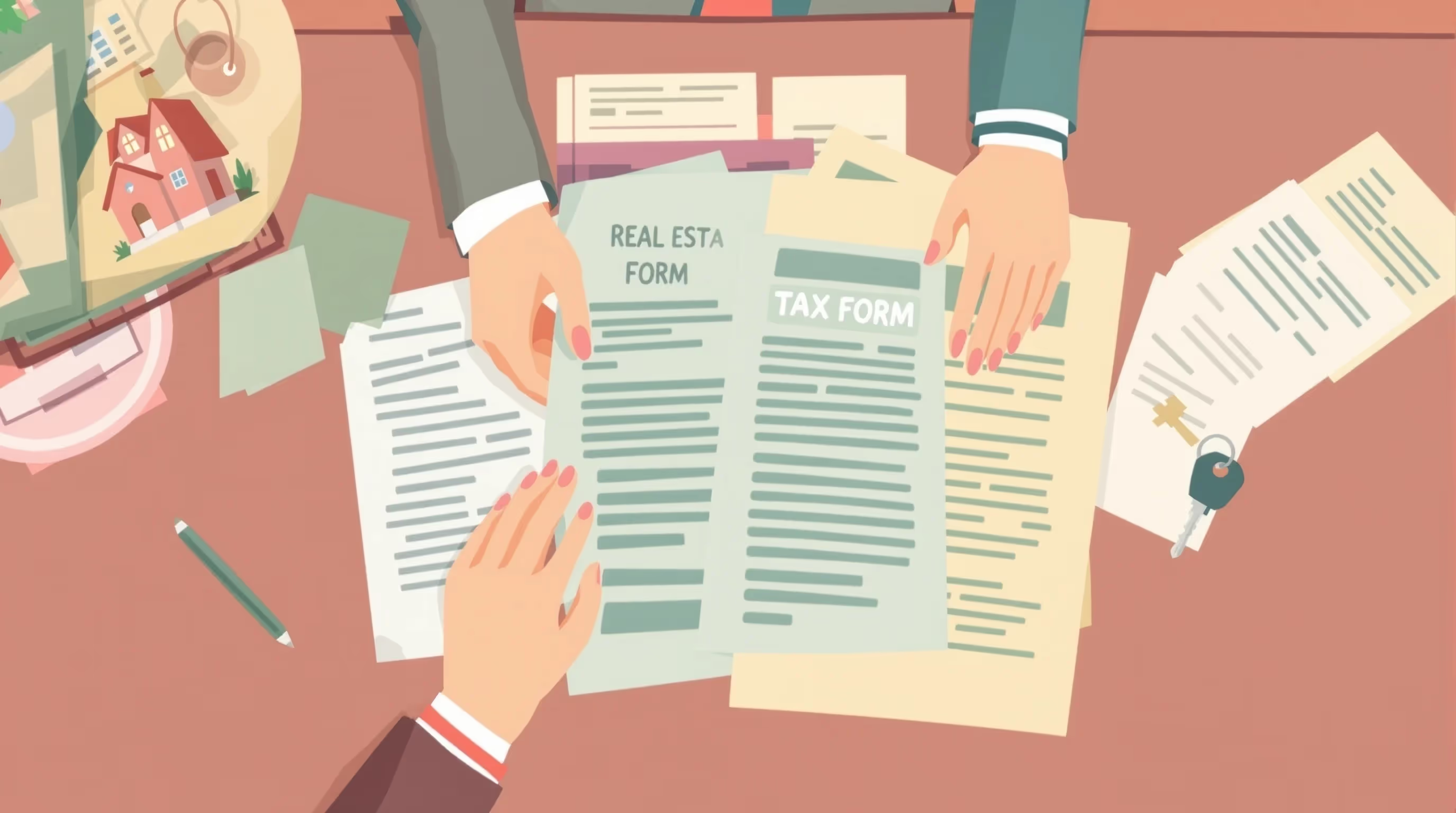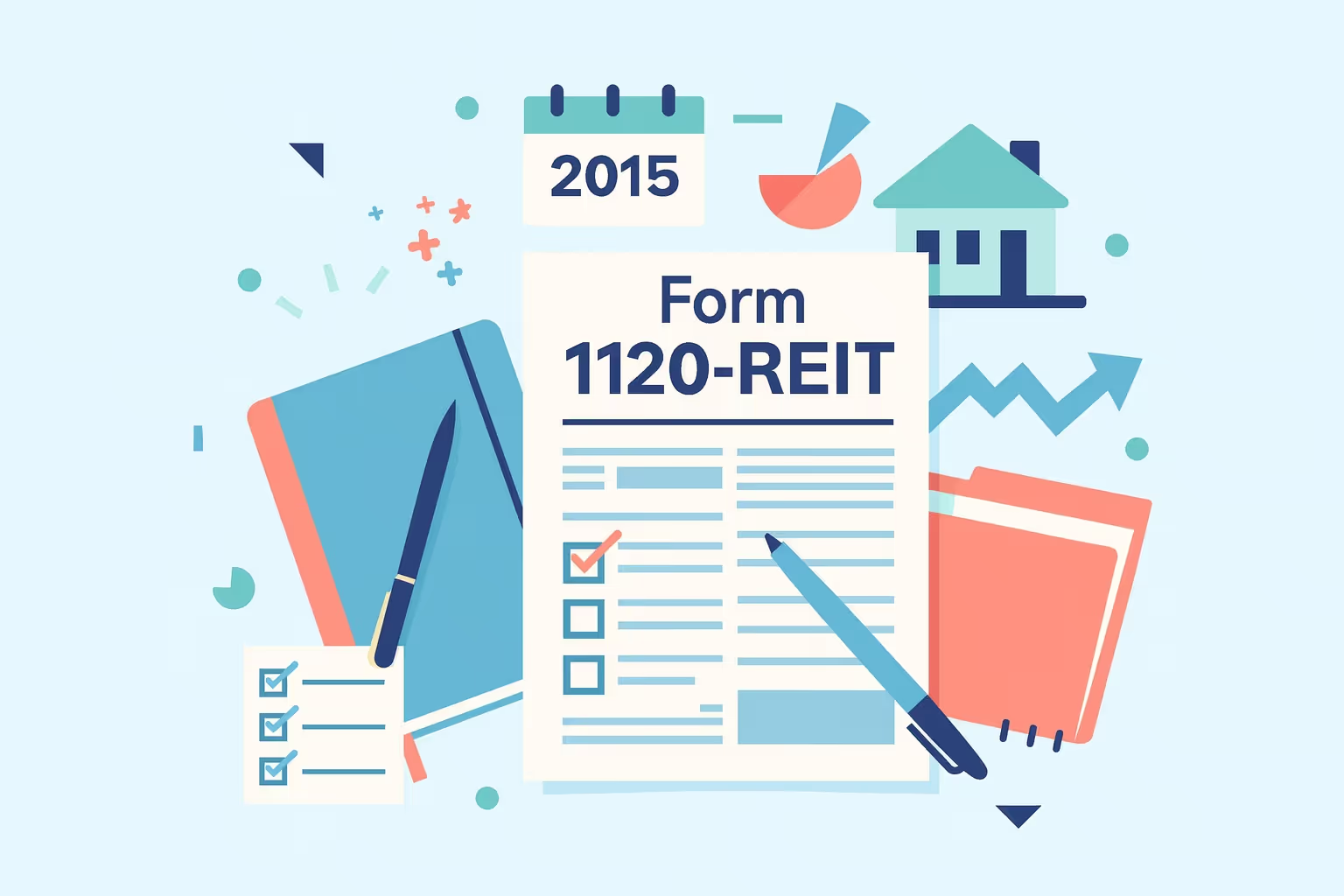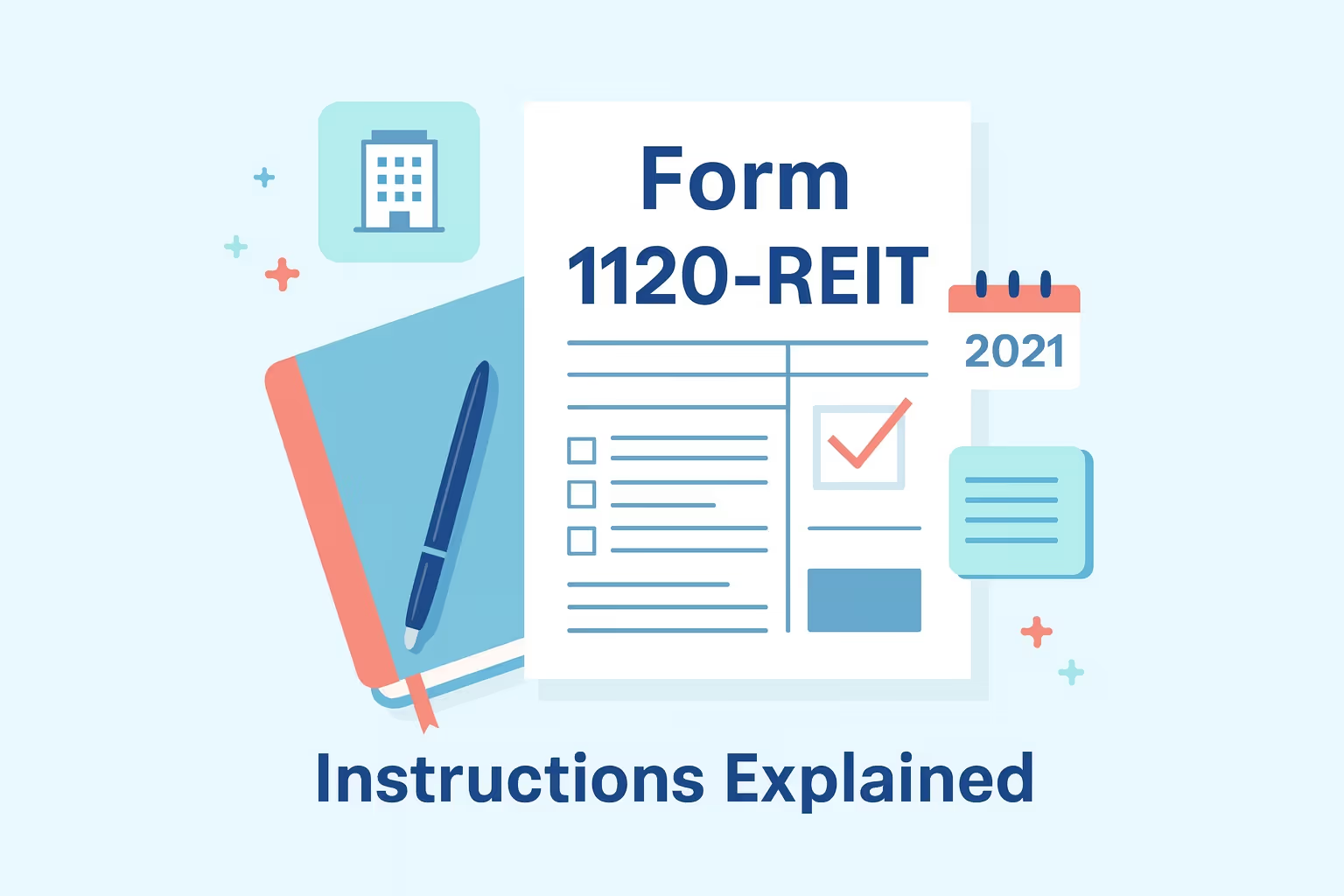
What IRS Form 1120-REIT (2020) Is For
IRS Form 1120-REIT (2020) is the official income tax return used by a Real Estate Investment Trust to report income, gains, losses, deductions, credits, and taxable income to the IRS. Real estate investment trusts are companies that invest in income-producing real estate or real estate assets, often including commercial real estate, residential properties, mortgages, and related assets.
Corporations, trusts, or associations that have elected REIT status must file this form if the election was applied for in 2020 or a prior taxable year and remains valid. Most REITs generally distribute dividends to shareholders based on the income generated from collecting rent, interest on mortgages, and capital gains from the sale of properties.
For a detailed breakdown of filing requirements, eligibility rules, and updates for this version, see our Form 1120-REIT 2020 Instructions for REIT Tax Returns.
When You’d Use Form 1120-REIT for 2020 (Late or Amended Filing)
You would file a late 2020 Form 1120-REIT if you missed the April 15, 2021, deadline (or October 15, 2021, with extension) and now must report gross income, ordinary income, capital gains, or other financial data tied to your real estate investment activities. Some REITs receive IRS notices for unfiled returns after e-file attempts fail or when a business files the wrong form.
Amended returns may correct issues such as REIT qualification, reporting errors involving REIT’s gross income, taxable income, or assets. Refund claims for 2020 expired on May 17, 2024, due to COVID-19 extensions. Therefore, late filers cannot request a refund; however, they must still pay the taxes owed and address any penalties. Many REITs that file late returns also review income generated from properties, REIT shares held by investors, and the last half of the taxable year to confirm compliance.
Key Rules Specific to 2020
- CARES Act charitable contributions: This rule suspended the 10% limit, allowing cash contributions up to 25% of taxable income for corporations and companies filing a REIT income tax return.
- Meal deduction: Business meal deductions increased to 100% for 2021–2022, affecting planning for real estate companies and equity REITs with expenses tied to property operations.
- Penalty relief: IRS Notice 2022-36 granted penalty relief for 2019 and 2020 returns with taxes under $100,000, allowing REITs to pay taxes late on income, rents, and capital gains.
- Distribution requirements: Revenue Procedure 2020-19 allowed publicly offered real estate investment trusts to satisfy up to 90% of distribution rules using stock dividends instead of cash when managing capital markets and investment obligations.
For complete details on wage reporting, withholdings, and unemployment tax filings, see our guide to Form 1120-REIT – Real Estate Investment Trusts.
Step-by-Step (High Level)
- Gather transcripts: Request 2020 tax transcripts using Form 4506-T to confirm IRS transcripts, gross income items, and financial data for the taxable year.
- Complete Form 1120-REIT: Fill out the 2020 form carefully, including calculations of dividends paid, capital gains, interest, rents, and other income tied to real estate investment and investing in properties.
- Attach schedules: Include Schedule A, Schedule D, Schedule K, Schedule L, and relevant forms such as Form 8996 for a taxable REIT subsidiary or related investments and obligations secured by mortgages.
- File and pay: File by mail or electronically if e-file options remain available, and pay all taxes, interest, penalties, and money owed based on the company’s income.
- Retain records: Keep records of assets, rents, real property holdings, investors, broker statements, and financial reports for audits or amendments.
Common Mistakes and How to Avoid Them
- Miscalculating the 90% distribution requirement: This mistake occurs when companies misreport dividends or income produced, so verify all dividend and rent calculations before filing.
- Overlooking ownership tests: Some REITs fail the 100-shareholder test or the five or fewer individuals rule when fewer individuals own too much stock. Maintaining accurate shareholder registers is crucial to documenting ownership.
- Using incorrect year forms: Filing the wrong form can cause delays or rejection, so always confirm that IRS Form 1120-REIT (2020) is the correct version for your filing.
- Missing required schedules: REITs sometimes omit Schedule D or Form 8996 related to taxable REIT subsidiary activity, so ensure all supporting forms are attached.
- Insufficient records: Weak documentation for assets, loans, obligations, rents, or related assets may raise examination issues; keep whole property and investment records.
- E-file issues: Some businesses submit incomplete attachments or unsupported 2020 versions during e-file attempts; verify software compatibility before filing.
Learn more about federal tax filing through our IRS Form Help Center.
What Happens After You File
The IRS typically processes REIT tax returns in 6–8 weeks for paper filings and 2–3 weeks for e-file submissions. Late or amended returns may take longer, especially if the company owns multiple properties or reports large-scale transactions involving investments, loans, and real estate.
You may receive notices regarding missing documents, questions about REIT qualification, dividend distributions, or confirmation that the company continues to qualify as a Real Estate Investment Trust. If taxes are owed, consider Form 9465 for installment payments. Penalties and interest continue until the balance is paid. Appeal rights are available if the IRS challenges reported income, assets, or capital gains.
FAQs
Can I still receive penalty relief for filing my late IRS Form 1120-REIT (2020) extension?
Penalty relief for a late IRS Form 1120-REIT (2020) may still apply under IRS Notice 2022-36, which waived specific penalties for 2020 income tax return filings. Relief depends on whether the Real Estate Investment Trust owed under $100,000 in taxes. Additional relief, such as a first-time abatement, may be available if the REIT has a clean filing history and can demonstrate reasonable cause for the late filing.
How do I obtain transcripts for my 2020 Real Estate Investment Trust return if I never filed one?
A Real Estate Investment Trust can request a verification of non-filing letter using Form 4506-T. This confirms that no income tax return was filed with the IRS for the 2020 tax year. The IRS generally processes the request within ten business days. REITs can also access transcripts online if the business has a registered account with verified financial data.
What if I discover my Real Estate Investment Trust did not qualify in 2020?
If a REIT did not qualify under the annual income tests, ownership rules, or asset tests, it may need to file a standard tax return instead of Form 1120-REIT. This changes how ordinary income, capital gains, and rents are taxed. Companies may need to amend returns, pay additional taxes, and correct issues that affect investors and shareholders.
Is the refund window still open for Real Estate Investment or REIT filers for 2020?
The refund window for 2020 is now closed, including for real estate investment structures, as the refund statute expired on May 17, 2024. Although no refund is available, filing the income tax return remains required so the company can correct its records, report financial data, and reduce penalties associated with unpaid taxes or unreported capital gains.
Do Real Estate Investment Trusts need to amend state tax returns after a federal change?
Real estate investment trusts often need to amend their state income tax returns if the federal return is amended. States follow different types of conformity rules, so adjustments to capital gains, ordinary income, rents, or assets may require a corrected state filing. Each state has different deadlines, penalty structures, and income tax requirements for REITs.
For more resources on filing or understanding prior-year IRS forms, visit our Form Summaries and Guides Library.


































